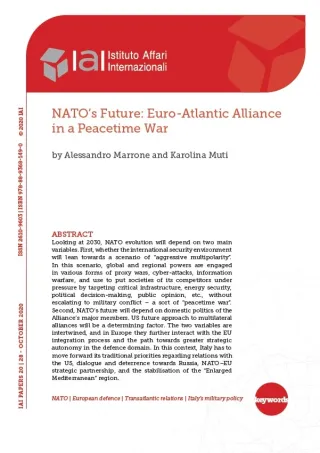Titolo completo
NATO's Future: Euro-Atlantic Alliance in a Peacetime War
Looking at 2030, NATO evolution will depend on two main variables. First, whether the international security environment will lean towards a scenario of “aggressive multipolarity”. In this scenario, global and regional powers are engaged in various forms of proxy wars, cyber-attacks, information warfare, and use to put societies of its competitors under pressure by targeting critical infrastructure, energy security, political decision-making, public opinion, etc., without escalating to military conflict – a sort of “peacetime war”. Second, NATO’s future will depend on domestic politics of the Alliance’s major members. US future approach to multilateral alliances will be a determining factor. The two variables are intertwined, and in Europe they further interact with the EU integration process and the path towards greater strategic autonomy in the defence domain. In this context, Italy has to move forward its traditional priorities regarding relations with the US, dialogue and deterrence towards Russia, NATO–EU strategic partnership, and the stabilisation of the “Enlarged Mediterranean” region.
Paper prepared for the webinar “The Future of NATO” jointly organized on 8 October 2020 by Aspen Institute Italia and Istituto Affari Internazionali, in partnership with Real Istituto Elcano and the Italian Ministry of Foreign Affairs and International Cooperation. Published also in Italian: “Il futuro della Nato: l’Alleanza euro-atlantica nella guerra in tempo di pace”.
Introduction
1. Aggressive multipolarity and peacetime war
2. The crossroads for NATO
3. Domestic strategic choices on both sides of the Atlantic
3.1 The US
3.2 Europe
3.3 The Turkey question mark
4. Implications for Italy and Italian priorities
4.1 An enduring transatlantic bond
4.2 Dialogue and deterrence towards Russia
4.3 NATO–EU strategic partnership
4.4 Stabilisation of the “Enlarged Mediterranean”
Conclusions
References


